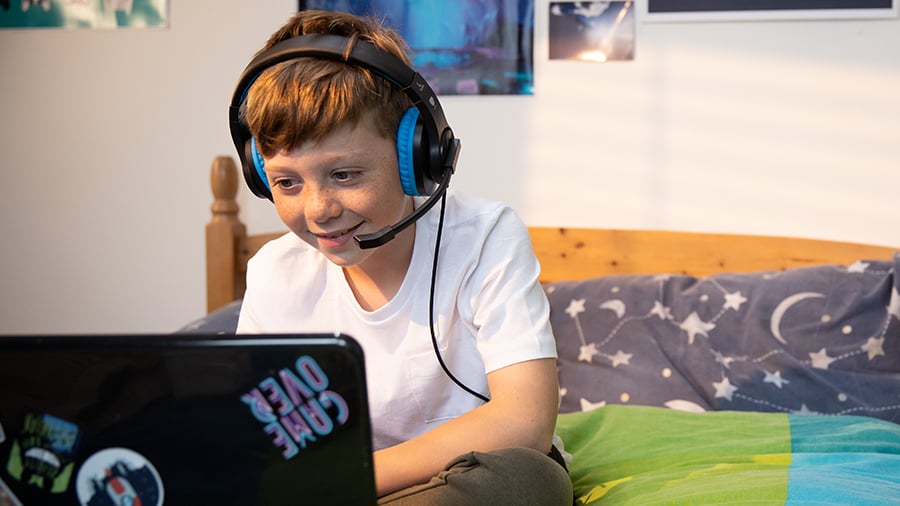Understanding online games

Online games can be a great way for children and young people to keep busy and stay in touch with friends and family, but it’s important that they play safely.
Things to consider if your child games online:
- age ratings of games they play
- messaging and contact functions on the games
- in-game purchases
- trolling, griefing and scams
- how to report problems
- where they can get further support.
Also, if you have more than one child in your home, be aware that games suitable for one child to play or watch, may not be suitable for another.
Games can be generally split into different types:
- simple, short games like Candy Crush or Angry Birds;
- creative games, solving puzzles or building worlds such as Minecraft;
- games that need strategy and skill to play, like chess;
- adventure games that explore different worlds and conflicts such as Fortnite or Call of Duty.
Many games can be a combination of types as well as having other features, like the ability to interact and communicate with others. As well as interacting, players can share content, purchase in-game items, create their own games within the game and so much more.
Children can play games on consoles, apps or websites, mobiles, tablets, PCs, or through smart speakers and virtual reality headsets. They can also chat to other players using messaging platforms for gamers, or watch livestreams of well-known gamers.
Gaming has always been a popular activity, particularly with children and young people, but not only are games very different now, so are the devices they’re played on, ranging from gaming consoles, PC’s, phones, tablets, smart watches, smart speakers, virtual reality headsets and others.
Games are more accessible than ever before. The huge range of games means there’s something for everyone. The reasons why they play online games and which games they play will change over time.
Some reasons include:
- Gaming can be social, when children play together on the same team, or play against each other. There are also location-based games which encourage players to go outside and explore, such as Pokemon Go and Wizards Unite.
- Using social media apps like Discord to connect with others within public and private servers (chat rooms).
- A sense of achievement for competition and advancement, and sharing achievements within the game and social media.
- Role playing, exploration or escapism
- Watching videos on YouTube for tips and tricks, developing their own gaming skills or even creating their own gaming videos.
- Entertainment - games are designed to be entertaining and can be fun and engaging for young people.
What are the risks of online gaming?
Children can be bullied for not playing a specific game, or have FOMO. They may be deliberately excluded from a game by their friends, or criticised for how they play. Other players may swear or use abusive language over voice chat, and this can be upsetting for your child.
If your child is experiencing bullying in online games, tell them they can talk to you or contact Childline and show them the blocking and reporting functions in a game, so they can prevent bullies from contacting them.
Griefers are gamers who deliberately try to ruin the game for other players. This can also be called trolling. Players may also try to trick or scam young people into giving up 'skins' or other in-game items by offering them money or by hacking their account. Skins are a cosmetic feature that let players personalise their character and in-game items, they can be extremely rare and valuable so losing them can be upsetting for a child.
Some games cost money to download, or players need to buy credits or items so they can keep playing. Many free games are designed to make the player want to continue but need payments to make this possible, which can be very frustrating. We suggest not storing payment card details on devices or in apps, to prevent charges building up.
Some games are designed to be played in teams or against other people, and sometimes players can be based in different locations. Young people can easily play with people they don’t know and haven’t met, communicating using voice, video or text chat.
Young people can also use other platforms, like Discord and Reddit, to learn tips about the games they play and speak to other players with similar interests. Many popular games have official channels with thousands of members. This puts young people at risk of grooming or online forms of abuse, along with the risk of moving the conversation to other platforms or meeting up offline. You should be aware of this across all online activity.
Tips for keeping children safe while gaming online
If you’re not a gamer, all the devices, the features, the interconnectivity with other games and apps can quickly become overwhelming so here are some helpful tips to help keep children safe while gaming online.
Most games have an age rating based on their themes those with violent and sexual content will have a higher rating. The age rating system is provided by PEGI and gives an overview of individual games which can help you to decide if it's appropriate. These ratings don't include communication features, so a game with a low age rating may let children speak to people they don't know.
Some games let players turn off communications features, mute voice chat and report other players who behave inappropriately. Look at the settings available to see what’s best for your child.
All major games consoles have settings that prevent children from finding inappropriate games. You can set limits on how long a young person can play and prevent them from speaking to unknown players. It's a good idea to explore these settings before your child plays the game.
Talk to your child about staying safe online, take an interest in the games they're playing and see if you can play them together and agree which ones are appropriate.
If you're going to set limits on the amount of time a child can spend playing games, make sure these are clear and that you agree them together. You could try agreeing the number of rounds your child plays instead of a length of time.
Take time to play games with your children so that you can understand the features. You can find out if there is anything concerning you need to be aware of, or safety features or parental controls which should be enabled.
- Ask why they like playing the game?
- Discuss who they’re playing with. Do they know everyone on their contact or friends list? Explain that conversations should only be about the game, and if someone starts asking them other questions or suggests they speak using another app they should tell you or an adult they trust.
- Talk to them about what they’re sharing. Use examples that are easy for them to understand, such as “You shouldn’t give your number or any other personal information to somebody you don’t know on the street. Is somebody online you don’t know any different?”
- Discuss in-game purchases with your child. These can be really enticing, it’s important to discuss that small amounts of money can add up very quickly. If you do allow your child to purchase items within the game discuss limits or set up their device so that purchases are turned off.
Consider creating a Family Agreement to establish some rules, which would include screen time or game-playing time. Remember that many games take a very long time to play and not all have regular ‘save points’. This can be very frustrating for a child who has spent a long time trying to get to a new level only to be called down for dinner. Give them fair warning, e.g. 20 minutes then 10 minutes.
Complete our Family Agreement online, or print out to fill in.
Need advice about online safety?
If you’re stuck, not sure what to do, or if you’re worried about your child, you can also contact our trained helpline counsellors on 0808 800 5000.
Childline also has lots of information about online and mobile safety that will help you and your child.
Deciding if a game is appropriate
There are four main things that you can consider to help you decide if a game's appropriate for your child to play:
Check the content of the game and any chat function:
Content within games is regulated and rated into age groups based on elements within the game such as sex, violence, gambling, drugs, in-app purchases etc. There are lots of different age ratings around the world, such as PEGI used in the UK. Always check the age rating to help you decide to allow your child to download or play a game - this is normally visible next to the game title within gaming and app stores.
Consider who your child could have contact with whilst using the game:
Consider any communication channels and if there are settings to turn off or limit chat functions. There can be different types of communications, e.g. group chat or private chat.
Communication in a game can increase the risk of bullying (sometimes referred to as being ‘griefed’ within gaming), being contacted by people they don’t know and potentially groomed or exploited. Many games have a means of communication which includes private messaging and private chat. Look out for:
- words like ‘whisper’ or ‘private’ next to messages if your child is playing in multiplayer games (especially if they are playing with people they don’t know offline)
- and any suggestion of taking the conversation to other messaging platforms.
Does the game affect your child's behaviour?
The behaviour of your child could be affected by some games, it can include bullying or ‘griefing’ others, trolling or other inappropriate behaviour. Very intensive games can result in short-term bad behaviour such as poor temper or ‘ragequitting’, which is getting so upset they stop playing immediately. Ensuring a game’s suitability can help, as can limiting playing time.
Does the game have in-app purchasing?
In-app purchases normally enhance the game or gameplay, for example skins (design of the character or weapon) or loot boxes (treasure chests, but you don’t always know what is in them). There can often be considerable pressure on children to be unique within their games (new skins) or to be better than others (purchasing power-ups). You should consider settings to turn off in-app purchases, or set a spending limit on the device or app.
Children need to be aware of scams involving free in-game currency (e.g. V-Bucks in Fortnite, or Robux in Roblox). Scam text messages, forum posts and videos may have content advertising free in-game currency. But they’re often scams, designed to coax the player into revealing their gamer tag (username) and password in return for currency. This is known as a ‘phishing’ scam.






